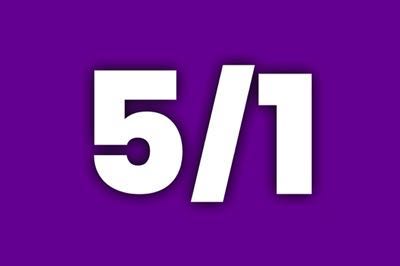
You can get a sense of the payout that you’ll be owed from a bookmaker for numerous different odds on this site. There are three main factors that dictate how much you are likely to get back from a bookmaker in the form of a payout, which are the odds that you receive, the size of your stake and the type of bet you choose to place.
On this page, we’ll be looking at a 5/1 bet, which essentially sees you get £5 back for every £1 that you spend on your stake, with the eventually amount also including the winning part of your stake in the total payout you’ll get.
Payouts
Whilst multiplying everything that you bet by five is simple when it comes to the idea of a bet, the reality is often much tricker. That is especially the case if you’re trying to figure out what it will be including your stake money or if you want to work out exactly what the profit you will have made from any given wager will be.
The following table obviously can’t cover every variation of a stake that you might choose to play, but it can give you a sense of how a bet that you’re placing is likely to work out depending on the figure that you choose to go for:
| Stake Amount | Payout | Profit |
|---|---|---|
| £1 | £5 | £6 |
| £2 | £12 | £10 |
| £5 | £30 | £25 |
| £10 | £60 | £50 |
| £25 | £150 | £125 |
| £50 | £300 | £250 |
| £100 | £600 | £500 |
Each-Way Payout
Understanding how much you’re likely to get in the form of a payout from a bookmaker is relatively simple when you’re placing a Straight bet, though obviously different people have different levels of mathematics skills and some will find it harder than others. It becomes much more complicated when you begin placing Each-Way bets though.
An Each-Way bet is really just a convenient way of placing a Win bet and a Place bet, with the bookmaker often paying out a reduced amount of odds, such as 1/4, on the Place part of the bet. Using our same example stakes, here’s how much you’d be paid depending on the outcome of the race:
| Each-Way Stake Amount | Total Bet | Win Payout | Place Payout |
|---|---|---|---|
| £1 | £2 | £8.25 | £2.25 |
| £2 | £4 | £16.50 | £4.50 |
| £5 | £10 | £41.25 | £11.25 |
| £10 | £20 | £82.50 | £22.50 |
| £25 | £50 | £206.25 | £56.25 |
| £50 | £100 | £412.50 | £112.50 |
| £100 | £200 | £825 | £225 |
Examples
If you’re looking at placing a bet with odds of 5/1, the reality is that the bookmaker doesn’t really think there’s a big chance of your horse winning. It might be because it’s taking part in a really open race, so the bookmaker is reluctant to give too long odds on a semi-decent horse but also doesn’t want to cut the odds too much. It might also be because the competitor is seen as something of an outsider but not enough to mean that the bookie is going to give them stupidly long odds. There is, of course, always a chance that such a horse, tennis player or football team will win, it’s just that the odds aren’t short on them doing so.
Interestingly, the winner of the first ever Cheltenham Gold Cup in 1924 was a horse with odds of 5/1 named Red Splash. The five-year-old finished ahead of a 7/1 offering and another horse with odds of 5/1 came in third. It then took another 35 years for a horse with odds of 5/1 to win, which was when Roddy Owen defeated Lindell for Danny Morgan. Between the first ever running of the Cheltenham Gold Cup in 1924 and the 2023 outing, just four horses with odds have 5/1 have emerged victorious, with the most recent victory begin that of Native River in 2018.
In a curious twist of fate, the first ever horse to win the Grand National at Aintree, Lottery, did so with odds of 5/1. Discount won it with those odds five years later, so the requirement to wait for another relatively long-odds winner wasn’t as bad for fans of the National. Between the first running in 1839 and the 2022 version of the event, seven horses have won with odds of 5/1. The most recent of those, though, was Manifesto in 1899, so it isn’t a price that many horses have won with in the modern era. As always, though, that doesn’t mean that they never will.
